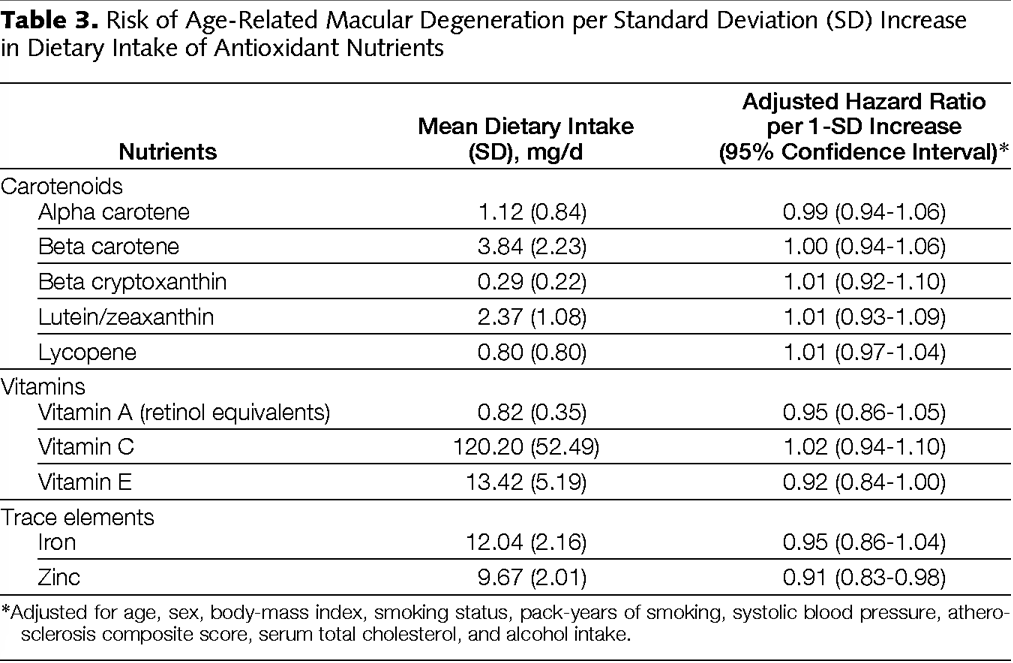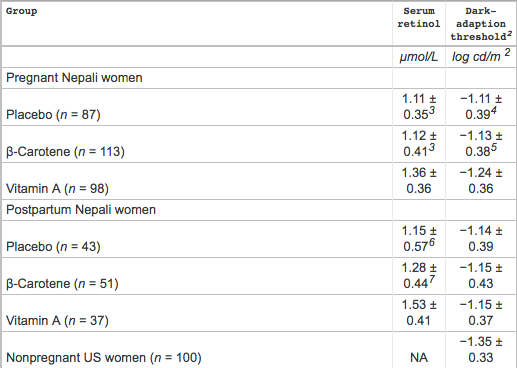Beta-carotene may moderately help maintain healthy vision and offer a slight boost to dark adaptation
![Beta-carotene. By Jynto [CC0], via Wikimedia Commons](https://supplementsinreview.com/wp-content/uploads/2016/12/1024px-Beta-Carotene-3D-spacefill-300x100.png)
- Enhancing nighttime vision. Beta-carotene may lower the dark adaptation threshold as well as diminish the risk of night blindness.
- Combating eye complications. Studies highlight this carotenoid’s capacity to reduce the risk of age-related macular degeneration, cataracts, and even blindness.
Overview
Beta-carotene stems from a family of vibrant red, orange, and yellow pigments known as carotenoids that permeate everyday fruits and vegetables. Since the discovery of its molecular structure in 1930, it has been routinely extracted from its natural food sources and used in medicine to improve overall health.
A typical diet including fruits and vegetables generally provides an ample supply of beta-carotene. It can also be used as a synthetic supplement, although research into its benefits in this form are still under development.
As a well-known antioxidant, beta-carotene is capable of boosting the immune system by countering the harmful effects of free radicals floating around the body. The protection it offers has made it a popular means of challenging heart diseases, fatigue, Alzheimer’s, psoriases and similar skin issues, and male infertility. Recent investigations have gone so far as to demonstrate its usefulness in enhancing vision.
![Foods rich in beta-carotene or carrying it as a pigment. By Images taken by various authors see individual images. The images have been combined by Jugrü [CC BY-SA 3.0], via Wikimedia Commons](https://supplementsinreview.com/wp-content/uploads/2016/12/Carotinoide.jpg)
How Beta-Carotene May Help With Vision
Beta-Carotene & Vitamin A
From a vision perspective, beta-carotene may be advantageous mostly for its conversion into vitamin A once in the body. When incorporated into nutrition pathways, beta-carotene is converted into retinal – which is essential for vision – and eventually into retinoic acid for cellular growth, including in the eye.
In this sense, beta-carotene serves as a dietary precursor of vitamin A (retinol, retinal) and may impart similar benefits to vision and eye health.2
One study examining the relationship between beta-carotene and vitamin A found that it provides about 50% of the vitamin A required in a standard American diet, although the effective absorption of the retinol from beta-carotene turned out to be quite low on average (4.097 ± 1.208%).3
Beta-Carotene Benefits & Uses for Vision
The primary benefits of beta-carotene seem to be as a means of reducing the risk of certain eye disorders. It has specifically been proposed to delay the development of age-related macular degeneration (AMD), age-related maculopathy (ARM), cataracts4, and arguably even night blindness in pregnant women.5 Beta-carotene seems to support maintaining healthy vision and at the least helping to minimize its deterioration, especially in the elderly.
Recent advancements have demonstrated the relevance of beta-carotene in vision adaptation as well. As a likely contributor to dark adaptation, beta-carotene may facilitate the performance of people who work, play, or perform in low-light or shifting-light conditions similar to the way black currant might. In addition, the carotenoid may provide a slight boost to night vision, which may just the kind of edge serious competitors are looking for.
![More details Effect of night blindness. Left: good night vision. Right: nightblind. By J.c.roeloffzen (Own work) [CC BY-SA 4.0], via Wikimedia Commons](https://supplementsinreview.com/wp-content/uploads/2016/12/P360_Onderdendam_goed_nachtzicht_ns_nachtblind.jpg)
Research
Human Research
The majority of clinical vision research centers on beta-carotene’s potential to combat certain eye problems. There’s contradictory evidence in regards to its ability to reduce the risk of age-related macular degeneration (AMD) and blindness. One area where beta-carotene seems to have a promising role is restoring and possibly even improving dark adaptation.
Beta-carotene (42 mg) may not be enough to reverse night blindness during pregnancy.
In this randomized, double-blind, placebo-controlled investigation, 202 pregnant Nepalese women who reported night blindness were given either a placebo, vitamin A at 7000 µg, beta-carotene at 42 mg, or zinc mixed in with each every day for 3 weeks. Although no significant improvements were noted in any of the groups, the vitamin A + zinc group were 4 times more likely to recuperate their night vision and also had a small improvement in pupillary threshold scores (by 0.21 log candela/m2; P = 0.09).
- The study concluded that “overall, there was no significant effect of daily supplementation with 25 mg Zn, singly or combined with ongoing vitamin A or β-carotene supplementation, on night blindness during pregnancy.”6
Beta-carotene may help reduce night blindness in pregnant women
In this randomized, double-blind, placebo-controlled investigation, approximately 202 pregnant Nepalese women who reported night blindness were given either a placebo, vitamin A, or beta-carotene throughout the course of their pregnancy. Vitamin A supplementation reduced the incidence of night blindness during pregnancy from 10.7% to 6.7%. Beta-carotene supplementation had less of an effect. Incidence (per 100 person-years) of night blindness for the first 3 months after giving birth was 8.7 for beta-carotene. In the second 3 months after giving birth, both vitamin A and beta-carotene decreased night blindness by roughly 50%.
- The study concluded that “beta-carotene reduced night blindness by approximately 50% [and]…may be needed to prevent maternal night blindness in rural South Asia.”7
In this prospective follow-up study, 464 adults with early age-related maculopathy (ARM) and 316 adults with neovascular ARM were assessed for food, antioxidant, and carotenoid intake. An inverse association was found between carotenoid-bearing fruit intake and the risk of neovascular ARM. Adults who consumed 3 or more servings of fruit daily had a decreased relative risk of neovascular ARM at 0.64 compared with those consuming ‹1.5 servings per day but no significant effect in standard ARM.
- The study concluded that “carotenoids were not strongly related to either early or neovascular ARM…suggest[ing] a protective role for fruit intake on the risk of neovascular ARM.”8
In this case-control investigation, 356 adults between 55 and 80 years of age with advanced age-related macular degeneration (AMD) were assessed for the impact that natural carotenoid intake had on their eyes. Adults in the highest quintile of carotenoid intake had a 43% lower risk for AMD. Several food items rich in carotenoids (especially lutein and zeaxanthin) were inversely associated with AMD.
- The study concluded that “increasing the consumption of foods rich in certain carotenoids, in particular dark green, leafy vegetables, may decrease the risk of developing advanced or exudative AMD.”9

In this prospective-design Rotterdam study, the impact of diet and supplementation was assessed in 4170 adults over the age of 55 years over the course of about 8 years. At the end of the investigation, high dietary consumption of vitamin E and zinc was tied to a reduced risk of age-related macular degeneration (AMD), and an above-average intake of a mixture of vitamins C and E, beta-carotene, and zinc was linked to a 35% lower risk of incident AMD.
- The study concluded that “high dietary intake of beta carotene, vitamins C and E, and zinc was associated with a substantially reduced risk of AMD in elderly persons.”10
In this double-masked investigation, 3640 patients between 55 to 80 years old were given a combination of vitamin C, 500 mg, vitamin E, 400 IU, and beta-carotene, 15 mg daily both with and without zinc. Antioxidants plus zinc significantly reduced the risk of progressing from age-related macular degeneration (AMD) to advanced AMD as well as lowered the rates of visual acuity loss (OR, 0.73; 99% CI, 0.54-0.99).
- The study concluded that “treatment with zinc alone or in combination with antioxidants reduced the risk of progression to advanced AMD.”11
Beta-carotene (7000 µg) may improve dark adaptation but not nearly as much as vitamin A

In this double-blind, placebo-controlled investigation, 535 pregnant women were given either a placebo, vitamin A at 7000 µg, or beta-carotene at 7000 µg throughout their pregnancy and assessed postpartum. Women with higher serum retinol concentrations had lower (better) dark-adaptation thresholds, which turned out to be better in vitamin A than beta-carotene groups.
- The study concluded that “women assigned to the vitamin A group had dark-adaptation thresholds that were significantly lower (indicating better dark adaptation) than those of women in the placebo and β-carotene groups.”12
Dosage for Vision
- Beta carotene may be taken as supplemental softgel capsule, 10,000 — 25,000 IU (10 — 30 mg), vitamin A as beta-carotene
- Ideally consumed as raw fruits and vegetables or a juice
- For cataracts, 20 mg daily or 50 mg every other day
- For age-related macular degeneration, 15 mg daily
Although beta-carotene generally has few side effects, it has even less risk when consumed via natural food products, which contain a mixture of all-trans beta-carotene and 9-cis beta-carotene, whereas synthetic beta-carotene only comes in the form of all-trans beta-carotene.
Supplements in Review Says
- Beta-carotene, 10 – 30 mg, combined with zinc & vitamins C and E
Beta-carotene has potential vision benefits. We recommend trying beta-carotene in combination with other nutrients for maximum impact. While beta-carotene alone may moderately improve dark adaptation and reduce the risk of eye conditions, such as age-related macular degeneration, it seems to have more potency when mixed with zinc and other antioxidants. What’s more, it seems to be less effective than its other form, vitamin A.
Try combining beta-carotene with zinc, vitamin C, and vitamin E. The body converts beta-carotene into vitamin A and we suggest using the latter. For those who are set on taking beta-carotene, it seems to be most efficient when mixed as 15 mg beta-carotene, 500 mg vitamin C, 400 IU vitamin E, and 80 mg zinc.
Leave a Reply